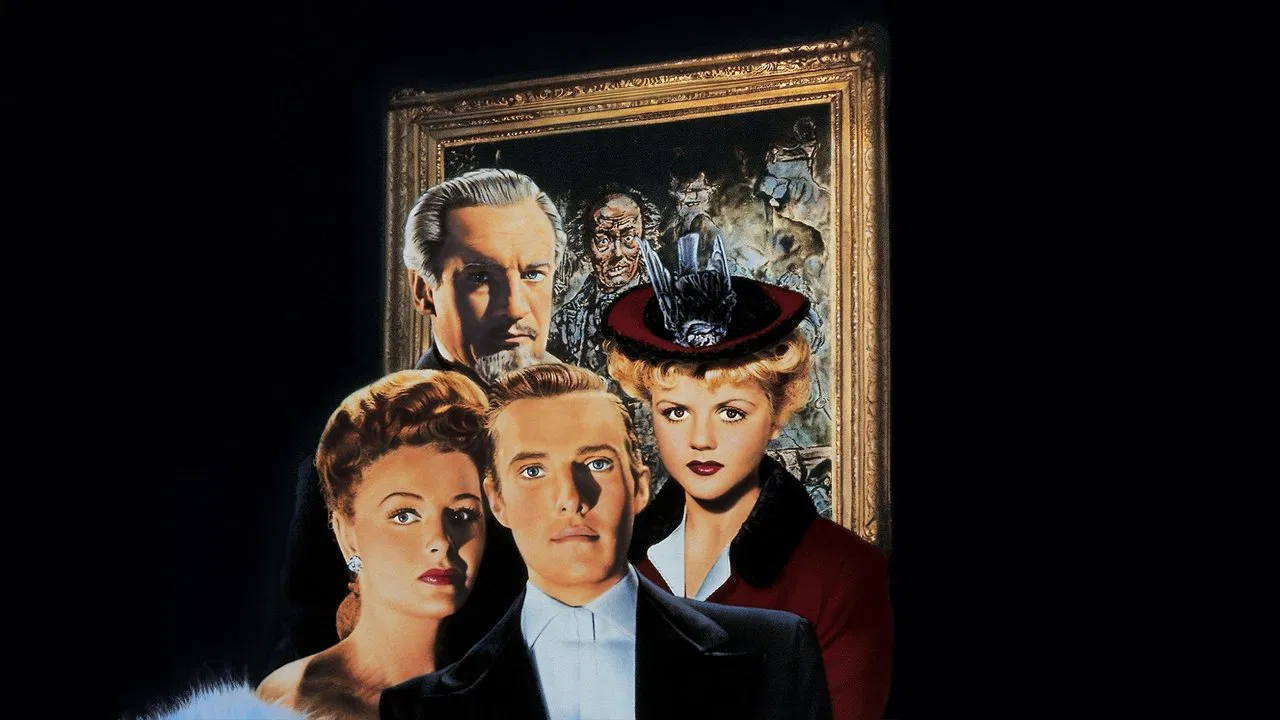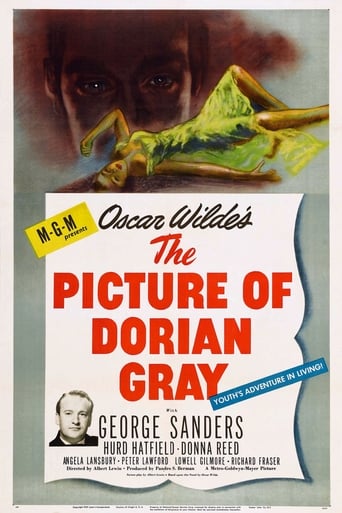

Wonderful character development!
... View MoreToo many fans seem to be blown away
... View MoreThis is a tender, generous movie that likes its characters and presents them as real people, full of flaws and strengths.
... View MoreJust intense enough to provide a much-needed diversion, just lightweight enough to make you forget about it soon after it’s over. It’s not exactly “good,” per se, but it does what it sets out to do in terms of putting us on edge, which makes it … successful?
... View MoreOscar Wilde's novel was one of the most convoluted but simultaneously fascinating and original stories I ever read, and it immediately made me suspect that a good or even half-decent film adaptation simply wouldn't be possible. But here we have a genuine Hollywood rarity; - namely a film version that is both respectful and doing justice to the source material! After having seen this 1945 version, directed by the extremely underrated director Albert Lewin, I don't think I can ever watch any of the numerous film versions that were released since. They just cannot be as good, period. Admittedly you must be in specific sort of mood to watch a film like this. "The Picture of Dorian Gray" is slow-paced, patiently taking its time to introduce the lead characters and even additionally clarifying the events via a stern voiceover. There's hardly any action or excitement, but it thrives for 200% on unsettling atmosphere and sublime performances of the stellar cast members whom almost literally melt together with their characters. The plot is an intelligent variation on the Faust theme. As soon as his close friend Basil finished his impressive portrait, young aristocrat Dorian Gray openly wishes to exchange his soul for eternal youth and power. Wouldn't it be wonderful if, instead of himself, his portrait would carry the consequences of Dorian's natural aging process and his lush escapades? This simply but highly efficient concept is brilliantly elaborated over a span of twenty years, with Dorian Gray slowly but surely descending deeper into corruption. Lewin also creates a magnificent Victorian atmosphere, with lavish turn-of-the-century decors and beautiful cinematography. Hurd Hatfield is fantastic as Gray; a stylish and sophisticated devil in disguise. Angela Lansbury and Donna Reed are breathtaking beauties with great acting talents, but the show is unmistakably stolen once more by George Sanders. Even though his role as Lordy Henry is, strictly seen, quite irrelevant, Sanders nevertheless draws all the attention to him. Sanders truly was one of the greatest and most fascinating, but sadly underrated, actors in history.
... View MoreOscar Wilde's bizarre story is brought vividly to life in this film of the same name, "The Picture of Dorian Gray." Hurd Hatfield is the man in question who wishes to retain his young looks while his portrait ages. While making his wish in the artist's house, a small statue of an ancient Egyptian cat with supposed supernatural powers close by him grants his wish. The forthcoming plot shows how Hurd goes through life affecting those around him negatively and how it changes his inner soul, all the while it is being reflected in the portrait. George Sanders is an acquaintance of Dorian's and the artist and is there while the wish is granted. George is all the time making generalizations about life, love, and women (witticisms when George Sanders say them) and in doing so displays his brusque cynicism; in short, he's a cad, and Sanders is in his element, stealing all the scenes he's in. But this film is exquisite in style, storytelling, and in capturing the time and place. Angela Lansbury costars and gives a very moving and memorable performance. Peter Lawford and Donna Reed also star, but they are given very little to do. No matter, because this is another example of how they just don't make movies like they used to. Winner of a cinematography Oscar, "The Picture of Dorian Gray" is an involved, intricate and intelligent film movie experience. Not to be dismissed as just a horror classic, this is a film classic for all those who enjoy good old-fashioned films.
... View MoreI will not add much to the many other worthy reviews of "TPODG" on this site except to say that, with the benefit of today's freeze frame, we can really appreciate the detail and quality to be found every shot. Each shot is lit with the mood in mind - and the lighting shifts as the mood shifts. The set dressing is a highlight on its own. The bric-a-brac in the backstage of The Two Turtles has been carefully selected for authenticity and to enhance the dramatic thrust of the scenes between Hadfield and Lansbury. The attic in which Dorian hides his portrait is a world of its own with a visual history of Dorian's innocent childhood days. It is all the more shocking that his corrupted adulthood as symbolised by his increasingly grotesque portrait is juxtaposed with the symbols of his days of contentment as a boy with a privileged and well-educated upbringing. Please watch this film if you wish to see what can be done with film when it is treated as being art.
... View More... as he was directed to play the part of Dorian Gray stiff and cold. I was motivated to write this review after watching last week's episode of TCM's "The Essentials" and hearing co-host Sally Field say that Hatfield was so dull, and that perhaps Peter Lawford should have played the part! Right studio, wrong actor. They were not making a musical comedy here! Some people on the Turner Classic Movies message board were suggesting Tyrone Power. The point is, these folks are not getting it at all.Hatfield plays Dorian Gray, an extremely handsome man of inherited wealth in Victorian England, who at age 22 has his portrait painted by his friend Basil Harwood. After the painting is finished Dorian wishes that he could remain forever young and the painting grow old. He does this in the presence of a replica of an Egyptian idol (a cat) that by legend has the ability to grant such wishes. Dorian gets his wish, although he doesn't realize it at first. The point is, the painting takes on the "life force" of Dorian. That is why the shots of it are the only ones taken in Technicolor in this black and white film. Dorian, in turn, "becomes" the painting. His expression is dull, lifeless, yet he is forever young. Likewise, the painting does more than age. The painting reflects the sins of Dorian to the point that, by the end of the film, the portrait looks like that of a demonic debauched horrible creature with smaller demons surrounding him.If somebody who leaps off the screen with charisma such as Tyrone Power had played Dorian Gray the way Power normally played most of his roles, the film would come out entirely wrong. I guess the things that do not ring true is how the women in Dorian's life are always saying that anybody that looks at Dorian can see that there is nothing but good in him. Wrong. There is nothing but nothing in him - he is like a handsome corpse in a coffin. Others have criticized the film because we do not see the great evils that Dorian does in his pursuit of pleasure. Thank not only the production code for that, but Oscar Wilde himself, who never enumerated Dorian's sins because he thought it would be better if the reader (in this case viewer) projected their own ideas about what Dorian had done to cause the portrait to transform so horribly.As for the other players, kudos to a young Angela Lansbury as Sybil Vane, the tavern singer who captures Dorian's heart after he has already become his portrait. Also, George Sanders, who convinces Dorian that only a life dedicated to pleasure is worth living, is always convincing and even witty as a devil in human form. It does beg the question, if Sanders is living the same kind of life as Dorian, since basically Dorian is a "disciple of his, why does he age normally through the 20 years or so that the film spans? This one is very much worth your time.
... View More